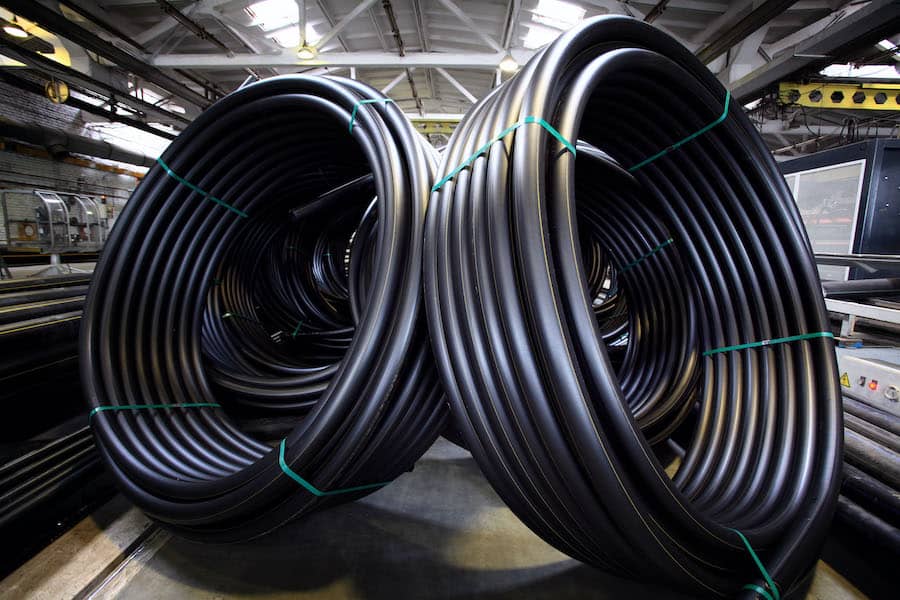What Is Ldpe Used For
LDPE and HDPE are thermoplastic materials under the family of polyolefins, which are petrochemical-based plastics that include polypropylene (PP) and polyethylene (PE). Polyethylene is the nigh common plastic fabric in the world and is known for its simple structure, the simplest of all polymers commercially available.
Collectively under the polyethylene course of materials, LDPE (low-density polyethylene) and HDPE (high-density polyethylene) accept shaped the landscape of the packaging and manufacturing industry. LDPE is well known for being widely used in plastic bags as its depression density makes it lite and flexible, rendering it perfect for this kind of awarding. HDPE, on the other manus, is harder and offers higher forcefulness and meliorate resistance to heat. Recently, it has become very popular as a source material for 3D printing filaments, used instead of ABS material. Information technology is too used to produce durable plastic parts such equally HDPE pipes, toys and plastic chairs.
Although LDPE and HDPE are both thermoplastic ethylene polymers, they differ in several properties and uses. One stark contrast is that LDPE has more branching than HDPE. Branching takes place during polymerisation, where polymer bondage have secondary polymer chains attached to them by replacing an cantlet in the primary chain with a monomer group. This weakens the intermolecular forces in the polymer. That is why HDPE have a higher force-to-density ratio than LDPE with increased tensile strength.
The varying uses of LDPE and HDPE are based on this fundamental structural divergence, among many other backdrop.
Here, you volition learn about:
-
The divergence in properties between LDPE and HDPE
-
The advantages and disadvantages of using each polyethylene textile
-
How each of them is produced and candy
-
The different applications of LDPE and HDPE

LDPE plastic bags
Backdrop of LDPE and HDPE
Although both materials come from the same ethylene monomer, the difference in chemic structure yields a wide variety of unique properties.
As its name suggests, low-density polyethylene (LDPE) has a lower density, forcefulness, and temperature resistance. Meanwhile, high-density polyethylene (HDPE) is characterized past higher specific force and heat resistance.
Table i. Comparison of the material properties of LDPE and HDPE
| Holding | LDPE | HDPE |
| Chemical construction | More branching | Less branching, more than linear |
| Density | Low density 0.91-0.94 g/cm3 | High density 0.95-0.97 g/cmthree |
| Flexibility | Low crystallinity (50-threescore%), and therefore more than flexible | Loftier crystallinity (>ninety%), which makes it tougher and more rigid |
| Heat resistance | Drastic decrease in density when subjected to temperatures beyond twenty°C | Able to withstand heat with temperatures more than than 100°C |
| Melting point | ~115°C | ~135°C |
| Chemical resistance | Resistant to virtually alcohols, acids, and alkalis; low resistance to oxidising agents and selected hydrocarbons | Superior resistance to solvents, alcohols, acids, and alkalis; depression resistance to most hydrocarbons |
| Force | Relatively increased impact strength in cold atmospheric condition | High tensile and specific forcefulness |
| Transparency | High, due to amorphous condition | Low, due to increased level of crystallinity |
| Maximum allowable stress at twenty°C | 6–17 MPa | xiv–32 MPa |
Pros and cons of using LDPE and HDPE
While both materials accept their corresponding benefits, they besides carry with them a number of disadvantages. Here's a listing of the pros and cons of each of LDPE and HDPE.
Table 2. Advantages and disadvantages of using LDPE vs HDPE
| LDPE | HDPE | |
| Advantages | Wide diversity of uses Depression cost Resistant to acids and bases Easy to process and mould Skilful electrical insulation Waterproof property May be processed as transparent | Broad variety of uses Low cost High tensile strength Able to resist low temperature Relatively stiff and stiff Waterproof property Adept electric insulation |
| Disadvantages | More prone to cleft stress Not useful in extremely high or low temperatures High permeability to carbon dioxide and other gases Piffling to no UV resistance | May crack nether stress Higher adventure of mould shrinking Piffling to no UV resistance |

Production and processing of LDPE and HDPE
How is LDPE produced?
LDPE is made through either a stirred autoclave or tubular reactor. Its full general manufacture involves the compression of ethylene gas, polymerisation using an initiator, and gas separation.
How is HDPE produced?
Almost HDPE materials are produced past either slurry polymerisation or gas phase polymerisation. The process starts with polymerisation from a solution of ethylene monomers, followed by separation and drying.
How are those two polyethylene materials processed?
Once produced, the thermoplastic material may be candy for consumer or industrial use by the post-obit methods:
Injection moulding
This rapid process converts LDPE and HDPE pellets or granules into custom shapes and sizes defined by the mould. The thermoplastic pellets are sent to a hot butt, from which the materials are melted through a screw barrel and heater bands. The molten plastic is and then injected to a pre-configured mould cavity, which as well cools down the textile. Afterward solidifying, the plastic material is ejected out of the moulding car.
- Injection Moulding of Plastics: An Overview
Extrusion
Similar to injection moulding, this as well makes use of heat to melt the plastic granules. The departure comes at the concluding section of the machine – in this case, the melted plastic goes through a pre-designed opening and is then cooled downwardly to solidify.
Blow moulding
This blazon of processing is usually carried out to manufacture hollow-shaped plastic goods. Instead of injecting the molten plastic, the process uses compressed air to blow the material into the mould.
- Blow Moulding: History, Process, and Types

HDPE pipes
Applications of LDPE and HDPE
LDPE applications include:
- LDPE plastic bags
- Low-cal packaging materials: Six-pack rings, waterproof carton lining, plastic wraps, snap-on lids
- Launder bottles
- Corrosion protection layer for work surfaces
- Calculator hardware covers and packaging
HDPE applications include:
- HDPE filament for 3D printers
- Strong packaging materials: canteen caps, plastic milk bottles, drums, bulk containers for industrial use
- Fibres for ropes, nets, and industrial fabrics
- Vehicle fuel tanks
- Boat parts
- HDPE pipes and tubing
- HDPE plastic chairs and tables
- Playground structures: slides, swing seats
- Consumer products: trash and recycling bins, ice cube containers, toys, ice chests

If you lot've enjoyed reading this commodity, you can as well read more related content here:
- Polyethylene: Properties, Processes, and Applications
- Materials Used in Food Packaging
- What is Polymerisation?
- Recycling vs Upcycling: Processes and Materials
- 400+ manufactures atMatmatch Resources
[1] Southward.T. Sam, M.A. Nuradibah, H. Ismail, N.Z. Noriman, S. Ragunathan, "Recent Advances in Polyolefins/Natural Polymer Blends Used for Packaging Application",Polymer-Plastics Engineering and Applied science, 53:6, pp. 631-44, 2014.
[2] A. Peacock,Handbook of Polyethylene: Structures, Properties, and Applications, NY: Marcel Dekker, Inc., 2000.
[three] NIIR Board of Consultants and Engineers,The Complete Technology Book on Plastic Films, HDPE and Thermoset Plastics, Republic of india: Asia Pacific Business Press, Inc., 2006.
[4] "Highlights of Low-Density Polyethylene", [Online] Available from: https://www.plasticsmakeitpossible.com/about-plastics/faqs/professor-plastics/professor-plastics-highlights-of-low-density-polyethylene/
[5] Yashoda, "Difference Between HDPE and LDPE", [Online] Available from: http://pediaa.com/difference-between-hdpe-and-ldpe/, 2016.
[6] J.P. Plog, "Processing Polyethylene", [Online] Bachelor from: https://www.thermofisher.com/weblog/materials/processing-polyethylene/, 2015.
What Is Ldpe Used For,
Source: https://matmatch.com/learn/material/ldpe-vs-hdpe
Posted by: bowennack1994.blogspot.com


0 Response to "What Is Ldpe Used For"
Post a Comment